Real Life From Syria
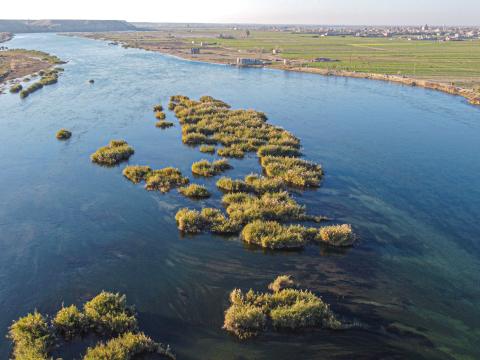
Still and wastewater are notorious for carrying various diseases most prominently, Cholera. This bacterium is rapidly spreading across Syria after the war damaged almost 70 per cent of the infrastructure- including water networks.
Syrians feel cornered with no means of securing clean water. The price hike makes purchasing water a luxury costing almost US$ 6 per five cubic meters. As the economic situation plummets and inflation increases, the currency value decreases intensifying people’s struggle. This is all part of a domino effect impacting Syrians’ ability to secure basics including water. Population density is another prominent reason for the rise in Cholera. There are 6.9 million people sparsed over these camps adding pressure on the temporary infrastructure.
To give a hand, World Vision is working towards reducing the outbreak’s spread and is currently implementing the Cholera-response project in multiple locations across Syria. While World Vision continues to provide medical support to Syrians infected by Cholera and raises awareness of transmission methods, some people weren’t fortunate enough to avoid the infection.
Tina, Sura, Salim and Mourad* are among 1,893 diagnosed cases of the Cholera outbreak in Syria and they are here today to share their stories.
Tina’s Life After Losing Her Husband
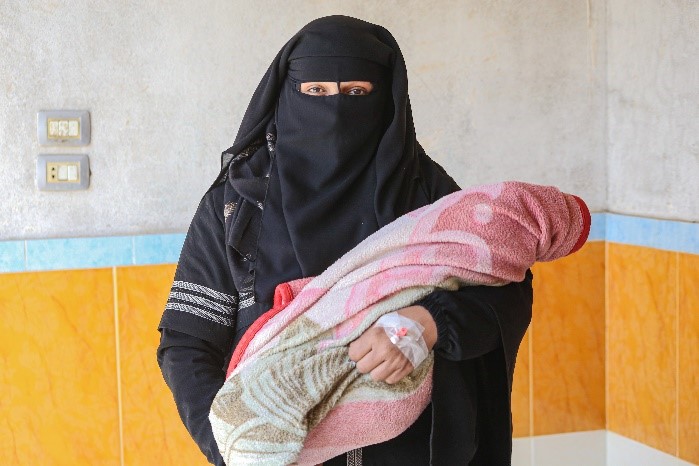
Tina holding her baby
Tina*, 35, had a rough life. The snowball effect began when the first clash broke out in her once-peaceful town in Syria. They could only go so far; her husband’s deteriorating health was eating his body away preventing them from seeking safety. As a result, they settled in the nearest camp in 2018 where her husband began treatment. Quickly, medical bills started piling up but Tina couldn’t work to pay the debt.
Tina had five children to care for and needed to his husband's support, but sadly he passed away after a long battle with cancer at the age of 37, “he was our support system. After his death, we have no one else. Now we are left with a pile of medical bills we can’t afford to pay,” she tells.
Tina felt helpless knowing she can’t provide for her children. Slowly, food on Tina’s table became a luxury and she and her youngest daughter were diagnosed with malnutrition. Luckily, her daughter received medical assistance and Tina is on her way to recovery.
Just when Tina thought she could take a deep breath, she began experiencing excruciating symptoms. “three months ago, I suffered from agonizing diarrhoea and stomach pain… so I went to the medical centre [funded by Cholera Response project] to receive treatment,” she explains.
Tina was in a terrible condition; her body lost fluids and was close to dehydration. Doctors immediately run tests only to diagnose her with Cholera. She thought back to the polluted water in the displacement camp as the main suspect. “They put me on an IV to replace the fluids I’ve lost and they assured it’s not concerning as long as I follow up with the treatment.” After being discharged, Tina went home with full awareness of how to keep her family safe. She cautiously carried on with daily activities remembering the doctors’ instructions and the way it transmits.
Unknowingly Bringing Cholera Home
“I felt scared when I was informed about the result. I didn’t know what to do to get better,” Mourad*, 42 years old.
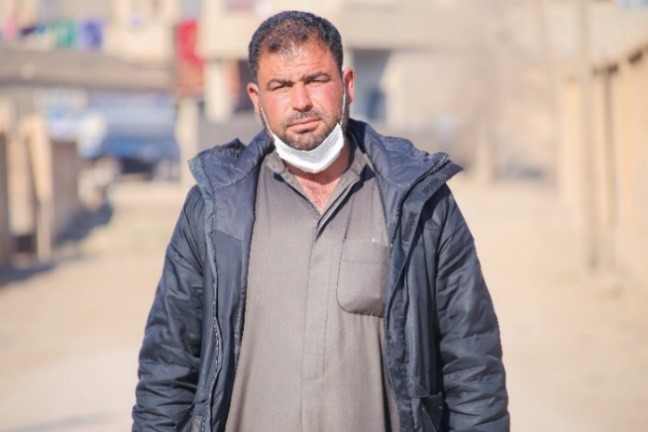
Mourad was able to recover from Cholera after seeking medical care
Mourad is a father of seven children aged from two and a half to 11 years old. He lives in a village in Eastern Syria. Although the father never set foot inside Syrian displacement camps, Cholera found its way into his home.
While the Syrian war made vegetables and fruits a luxury, Mourad does his best to make them available for his children. Little did he know they would be the source of the fast-spreading Cholera outbreak.
Two months ago, Mourad felt a little uneasy. At first, he brushed it off thinking his stomach was upset due to cold weather. But a couple of days after, pain began digging through his guts preventing him from breathing. Desperation and fear overtook his conscience knowing this harrowing pain could only result in a visit to the medical centre. He was worried about managing his finances; he barely covered his eight-year-old daughter’s periodic medications and consultations to treat her diabetes.
But when the situation progressed, “I felt exhausted and experienced diarrhoea and vomiting”. Mourad could barely stand he was transported by an ambulance to the medical centre. “They immediately put me on IV and did tests only to tell me I had Cholera,” he shares. The doctor provided Mourad with the needed medication and ways to prevent any further infection among his family members.
Second Time the Culprit
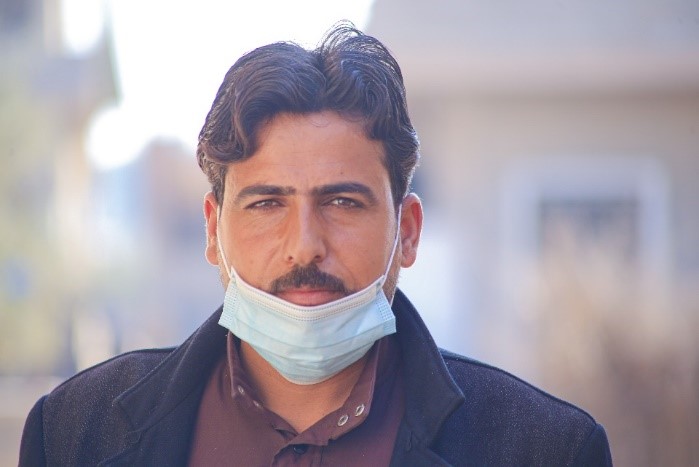
Salim was able to recover fully after Cholera infection.
Salim’s*, 42, story is similar to Mourad, he even lives in the same area, and dirty vegetables were the main culprit for his Cholera infection. The father of five takes good care of his children. He ensures their food cleanliness knowing Cholera is spreading through contaminated water across Syria. However, Salim didn’t know unwashed vegetables can carry the bacteria.
Unfortunately, two months ago, Salim awoke to a stabbing pain in his stomach and diarrhea. Feeling terrified and confused, he went to seek medical advice under the Cholera Response-funded medical centre. “As soon as I was admitted, they began first aid, provided me with saline solution, serums through an IV to regain my strength,” he shares.
Salim’s body could barely sustain itself after Cholera invaded his body and emptied it of vital liquids. To confirm the diagnosis, the medical team conducted tests only to break the news to Salim, “they told me it was Cholera. I was scared but the doctor assured me they will look after me and I will get better after a couple of days”. Indeed, Salim’s body was able to recover and he was able to stand on his feet.
But before being discharged, the doctor advised him to wash food, including vegetables with safe water thoroughly and ensure personal hygiene. The doctor also warned Salim, despite feeling better, he should maintain his hygiene habits not to infect his family members - at least until he’s fully recovered. During this period, Salim kept visiting the medical centre for ongoing consultations and medications. “I am healthy now, I have learned so much from this experience. I have learned not to panic,” he happily shares.
Are All Syrians As Lucky As Sura?
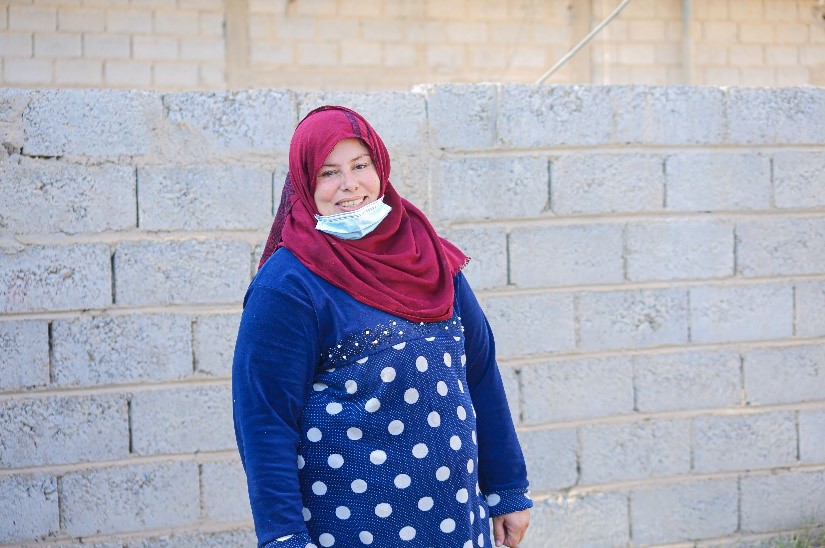
Sura got infected with Cholera after drinking contaminated water
Before stomach pain took Sura*, 58, by storm, she was barely adjusting to her life-long companion- diabetes. Just like people progressing in age, Sura accepted the fact that she has diabetes and began taking medications for it. However, two months ago, the mother of four [20, 22, 25 and 30] was alarmed after feeling pain in her abdomen and severe diarrhea.
“That’s when it all clicked, I knew the symptoms of Cholera after the awareness teams visited us and told us about the outbreak. I immediately quarantined myself. I did not want to infect my family,” she explains.
Sura was aware enough to keep her family safe knowing its infectious can travel from one to another easily. She visited the project’s clinic where they provided her with the needed support but “my diabetes made the pain worse, I kept experiencing diabetic attacks that made everything worse,” she tells. While Sura was in the hospital, she began thinking of the source of the infection. All figures would point to the contaminated water across Syria “I drank unpurified water, it's very difficult because there isn’t completely clean water,” she testifies.
Thankfully, 5217 people like Sura, Salim, Mourad and Tina were lucky enough to receive timely medical intervention under the Cholera Response Project. But what is the fate of 77,561 suspected cases around Syria?
*Names are changed to protect identities.